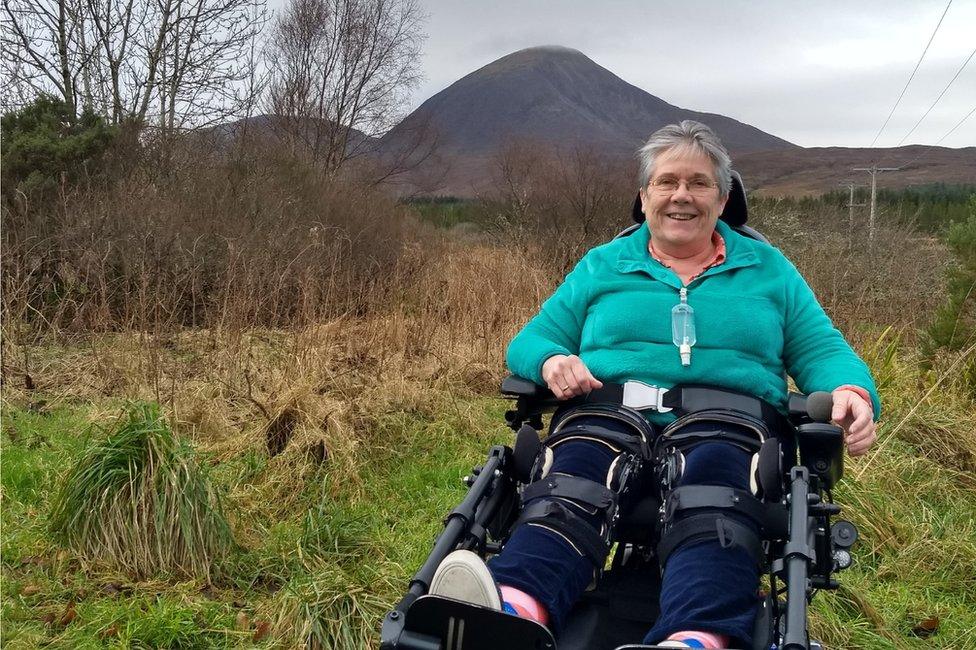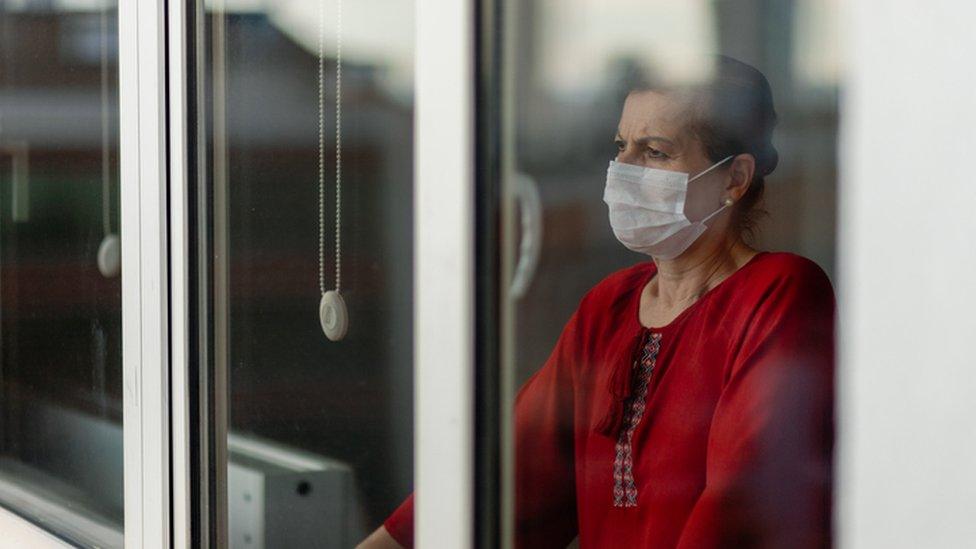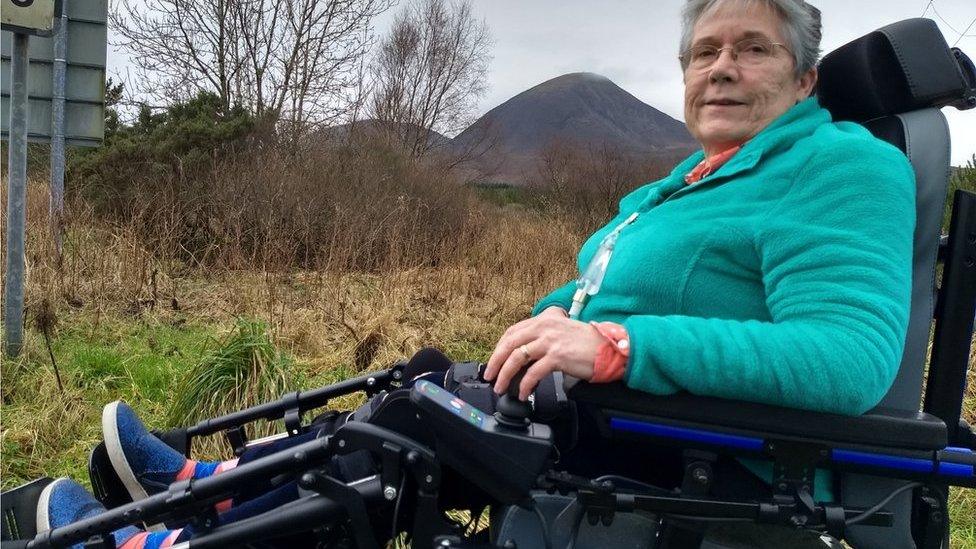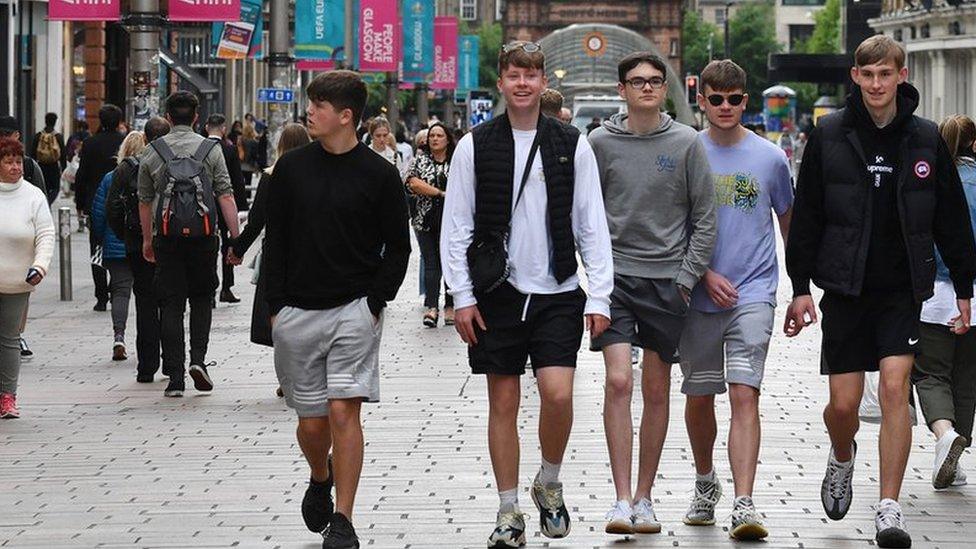Covid in Scotland: Why I'm still shielding after level zero
- Published
Adults with physical and mental health conditions are far more anxious about pandemic restrictions lifting than the general Scottish population, a new study has suggested.
The Mental Health Foundation says lone parents and older adults are also more likely to be concerned about rules easing or another wave of the virus.
The BBC has spoken to one woman with a rare tissue disorder, who is continuing to shield beyond level zero.

Dr Caroline Gould, who lives in Broadford on the Isle of Skye, has been inside a shop on three occasions since March 2020.
"I know a lot of locals and it seems to be visitors that aren't wearing masks, respecting social distancing," she said. "People lean from one side of my wheelchair across my face to reach across the shelf rather than waiting for me to move.
"Once I stopped in an aisle and people squeezed by - I ended up getting hit on the head with a wire basket. It doesn't encourage me to go out again."

Dr Caroline Gould (PhD) feels that people with disabilities have been given little consideration during the pandemic
Caroline has a severe form of Ehlers-Danlos syndrome, which means her body lacks collagen and her joints are prone to dislocating - on average she says she experiences between 40 and 50 full or partial dislocations each day.
She also has additional health problems and keeps to a very strict diet, which involves buying food from a number of different shops around the island.
In December Caroline told the BBC she had lost two stone because she could not access the foods she needed - now she has lost closer to three stones (19kg).
Caroline is concerned that the problem could continue because some supermarkets that offer delivery are not stocking the foods she needs, while others no longer prioritise vulnerable people for click-and-collect.
Meanwhile travelling outdoors even in a small community such as Broadford also presents problems because of Skye's tourist traffic over the summer.
"When I'm crossing the road people have been helpful," she said. "But there have been times when I've had to wait two hours to cross the road because there's so much tourist traffic.
"There are coaches, loads of people, cars with big roof boxes on - it gets really busy. I also get people putting their hand on the back or arm of my wheelchair, or on me - which is a kind thought, but it's ignoring social distancing.
"Very often people outside don't have a mask on. I'm the one who is seated at a lower level, so if they have droplets with Covid, gravity will take its toll on me."
'I shouldn't have to fight this hard'
As an accessibility auditor for Skye and Lochalsh, Caroline regularly hears about the "battles" of vulnerable people and those with disabilities in the local community.
She has heard of issues ranging from availability of disabled parking to accessibility problems with new outdoor hospitality spaces which were quickly built as the economy reopened.

More than 60% of people questioned with physical or mental health issues had anxiety about restrictions being lifted
Caroline has also found herself battling on behalf of her husband, after he had to go into hospital for 11 days for a non-Covid illness.
On one occasion she complained to the Scottish Ambulance Service after she said paramedics refused to allow her to accompany him to hospital, despite instructions from his GP.
"My complaint was resolved," she said. "But I shouldn't have had to fight hard to get my husband's needs met.
"The attitude is we're the diseased ones, but actually we've been shielding since last year and continue to do so because of other people's behaviour.
"We need to see the Scottish government acknowledge the needs of people who say they are anxious.
"We want to be able to go out and start socialising again - we want the right to do all of those things and for people to think about us when they're making changes."
Caroline spoke out about her experience as a study by the Mental Health Foundation suggested adults in Scotland living with physical or mental health conditions are significantly more anxious about the easing of coronavirus restrictions.
About 61% of those questioned who had long-term ailments were "fairly" or "very" anxious about it, the study showed. The figure for the general population was 45%.
'Support for every person'
Panelbase surveyed more than 2,000 Scots between 16 June and 2 July for the research, as part of an ongoing study of the pandemic.
Overall, 45% said they had recently been concerned about another wave of coronavirus emerging.
Susan Solomon, senior research manager at the Mental Health Foundation in Scotland, said the research demonstrated that existing inequalities experienced by particular groups have been "exacerbated".
She said: "We know that people who identify within these groups are more likely than the general population to have lived with loneliness, anxiety, hopelessness, stress and, for some, feeling suicidal.
"We must ensure support is there for every person who needs it in the recovery phase.
"We urge the Scottish government to fully realise its Transition and Recovery Plan commitment to provide appropriate mental health support to people with long-term conditions whose mental health has been affected by the pandemic."


Are you anxious about restrictions lifting because of a long-term physical or mental health condition? Please share your stories with us.
You can now get in touch with BBC Scotland on the phone messaging service, WhatsApp.
To start using the app, simply download WhatsApp on to your smartphone free from the internet, external.
Then add our WhatsApp number +44 7902 704679, external to your phone's contact list.
Please make sure you read our terms of use and privacy policy.


Related topics
- Published14 December 2020

- Published9 August 2021
